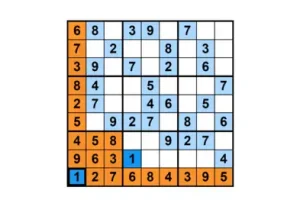Sudoku
Sudoku Challenge
The Sudoku metaphorical gauntlet has been thrown down. Will you take up the challenge or walk on by (and let the machines win?)
IMPORTANT
There are some game specific features you should know that will make your game more enjoyable….
Below the puzzle there are two boxes…
 You are entering the final number in the cell (Click on it to change )
You are entering the final number in the cell (Click on it to change )
 You are entering candidates (click on it to change )
You are entering candidates (click on it to change )
 Select the NUMBER FIRST then choose the cell (Click on it to change)
Select the NUMBER FIRST then choose the cell (Click on it to change)
 Select the CELL FIRST then choose the number (click on it to change)
Select the CELL FIRST then choose the number (click on it to change)
Click on any number in the 9×9 grid to highlight the area of influence for a number. The grid will also highlight the same number elsewhere.
In the example 1 is selected by clicking the 1 in the bottom left corner of the grid. The area in orange is the area of influence

 Select this to reduce the game screen
Select this to reduce the game screen
 Select this to expand the game screen
Select this to expand the game screen
![]() Select this to get some more game options
Select this to get some more game options
How do I return to the puzzle? – Just click anywhere on the white board, and the board will disappear!
How to play Sudoku
Setup:
A Sudoku grid consists of a 9×9 square grid, divided into nine 3×3 subgrids.
Some of the grid cells are pre-filled with numbers, forming the initial puzzle.
Objective:
The goal of Sudoku is to fill every empty cell in the grid with a number from 1 to 9, following specific rules.
Gameplay:
Each row, column, and 3×3 subgrid must contain all the numbers from 1 to 9, without any repetition.
Initially, the puzzle provides some numbers as clues, and your task is to deduce the correct numbers for the empty cells.
You can only place one number (from 1 to 9) in each empty cell.
Moves and Strategy:
Examine the initial puzzle and identify any cells that already have numbers filled in.
Based on the provided numbers and the rules of Sudoku, deduce the correct numbers to fill in the empty cells.
Start by focusing on rows, columns, or subgrids that have the most filled cells, as they may provide more information for deducing other numbers.
Use the process of elimination by considering the numbers already present in rows, columns, and subgrids to narrow down the possible options for each empty cell.
Look for “single possibility” cells, where only one number fits the rules. Fill those cells first before moving on to more complex deductions.
Continuously analyze the grid and update the possibilities for each empty cell until you successfully fill the entire grid.
Winning:
You win Sudoku by correctly filling all the empty cells in the grid, ensuring that each row, column, and subgrid contains all the numbers from 1 to 9 without any repetition.
Remember, Sudoku puzzles can vary in difficulty, and advanced techniques like “naked pairs,” “hidden singles,” and “X-wing” may be employed to solve more challenging puzzles. This guide covers the basic rules and strategies for Sudoku, but you can explore additional resources and techniques to enhance your gameplay.
great fun when you win
its you against the machine and good if you win
